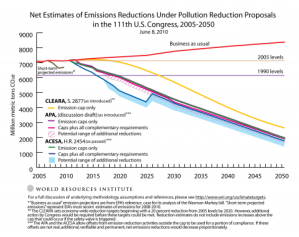While the Socratic exercise that is the House hearings on Big Oil go on—and on, and on—this afternoon, it’s not the only piece of energy and environmental news today. The Environmental Protection Agency released today its preliminary economic analysis of climate and energy bill co-sponsored by Senators John Kerry and Joseph Lieberman, and the news is good for greens, according to the Hill’s E2 Wire blog:
A new EPA analysis of Senate climate change legislation estimates the plan would impose an average annual household cost of $79 to $146 over 40 years.
The finding could provide a political lift for the bill authored by Sens. John Kerry (D-Mass.) and Joe Lieberman (I-Conn.), allowing them to counter GOP allegations that greenhouse gas limits would impose major costs on taxpayers.
Kevin Knobloch, the president of the Union of Concerned Scientists, said in a statement this afternoon that:
The EPA’s analysis removes the last excuse senators may have for not passing strong climate and energy legislation this session. We know the causes of global warming. The National Academy of Sciences recently confirmed that burning fossil fuels is the primary driver of climate change. And now we know that the Kerry-Lieberman bill would invest in a clean energy future at a minimal cost. That’s not surprising. The National Academy of Sciences found that the economy would continue to grow substantially even when taking into account the costs of reducing emissions.
Kerry and Lieberman will be talking about the analysis later this afternoon—we’ll have more. But an analysis that indicates cap and trade ultimately won’t raise household energy costs much is a nice bullet for Obama to have as he prepares for his Oval Office speech on the oil spill and energy this evening.
Update: In the meantime there are a few other independent studies on the Kerry-Lieberman—otherwise known as the American Power Act. The ClimateWorks Foundation in San Francisco found that the bill would create 440,000 additional jobs a year through 2020 and actually save consumers $35 on their annual household utility bills through 2020 while reducing greenhouse gas emissions by 3.6 billion tons a year by 2030, a 45% cut compared to business as usual. Meanwhile at Grist, Trevor Houser and Michael Levi looked at how the American Power Act would impact the country’s energy security according to an index created by the U.S. Chamber of Commerce, which has fought hard against cap and trade. The Chamber has argued that the bill would actually leave the country more dependent on foreign energy, but Houser and Levi argue persuasively that the Chamber is pretty much totally wrong.
Updater: The World Resources Institute did an earlier analysis of the bill last week, which includes a neat chart comparing Kerry-Lieberman to other energy bills taken up by Congress:
On his website, Kerry has summarized the EPA’s first pass at the American Power Act:
- decreases energy bills for households through 2030 and minimal impact on households’ overall costs through 2050;
- offers significant changes from previous legislation, including more robust and effective cost containment;
- keeps allowance prices low, $16 in 2013 and $20 in 2020;
- keeps overall household costs to a minimum for the life of the bill: about $80-150 per year; and
- ensures those families most affected by energy prices are protected.



